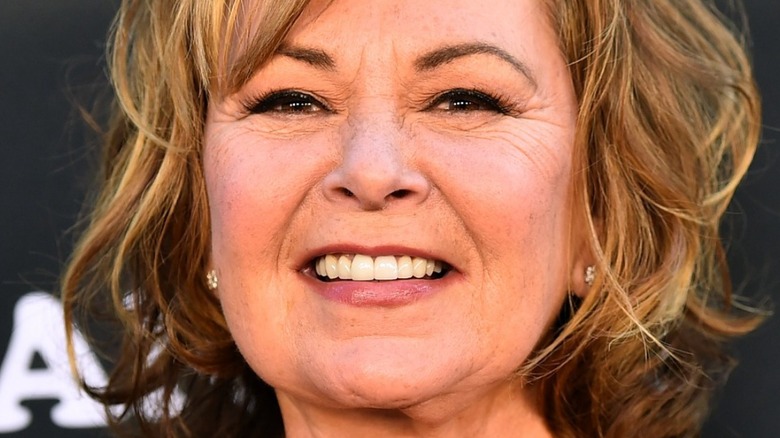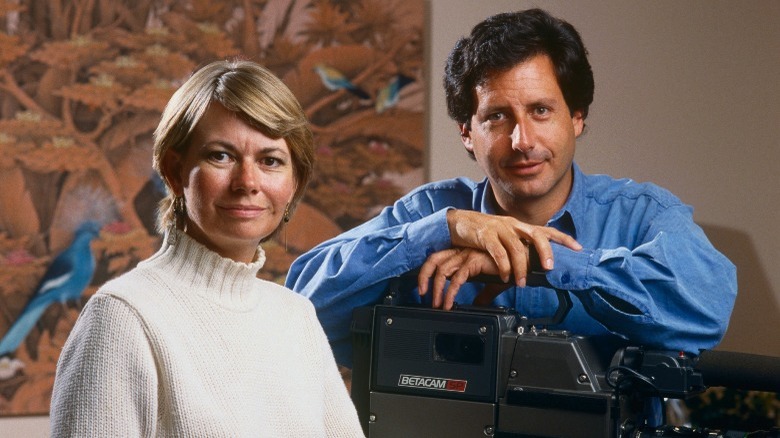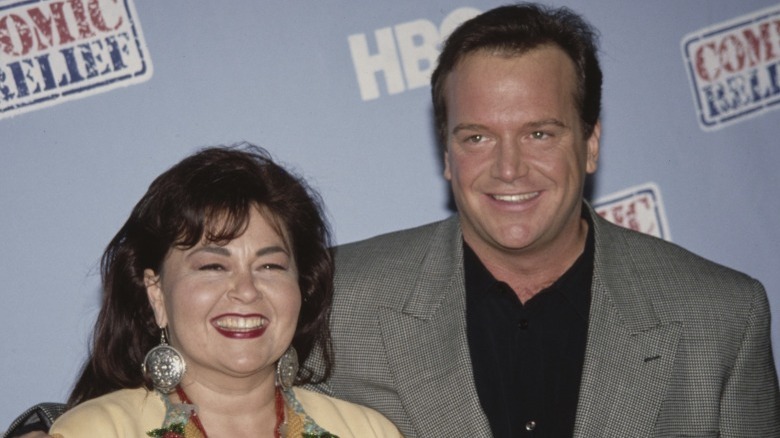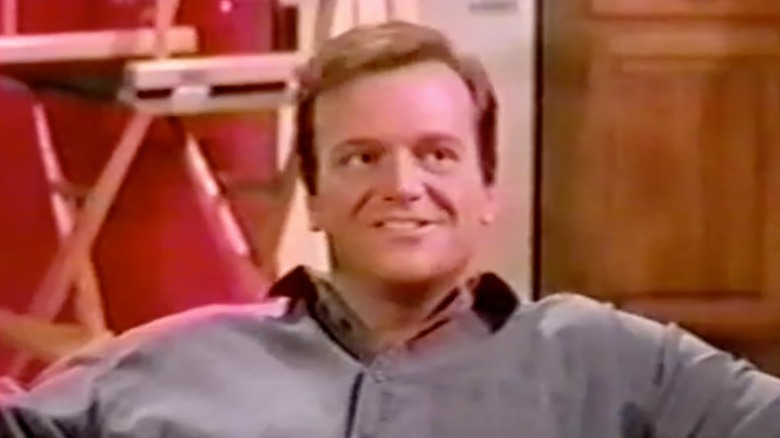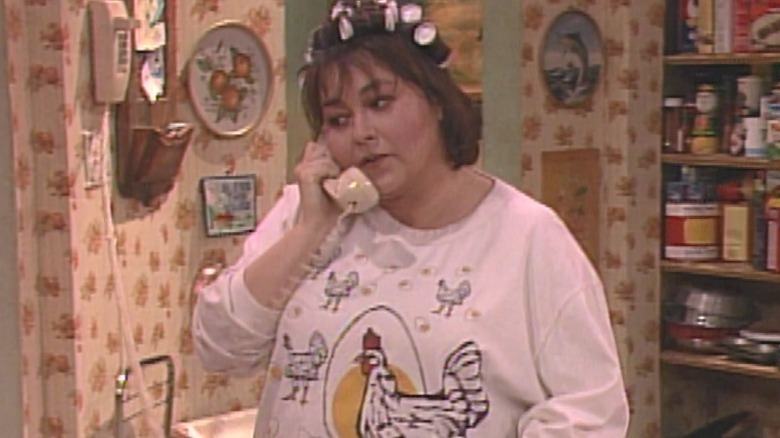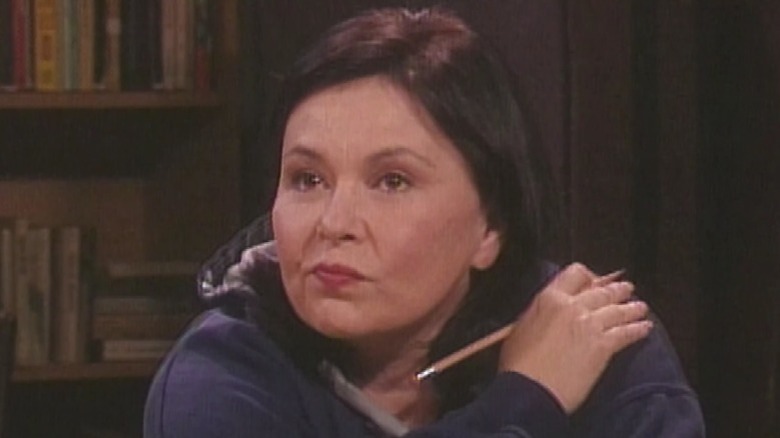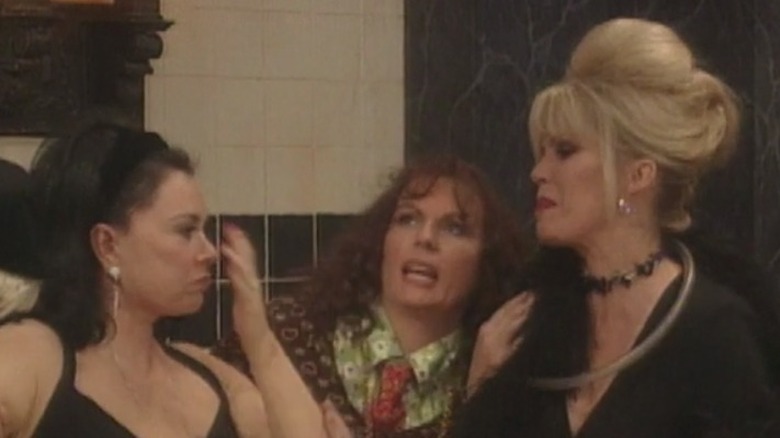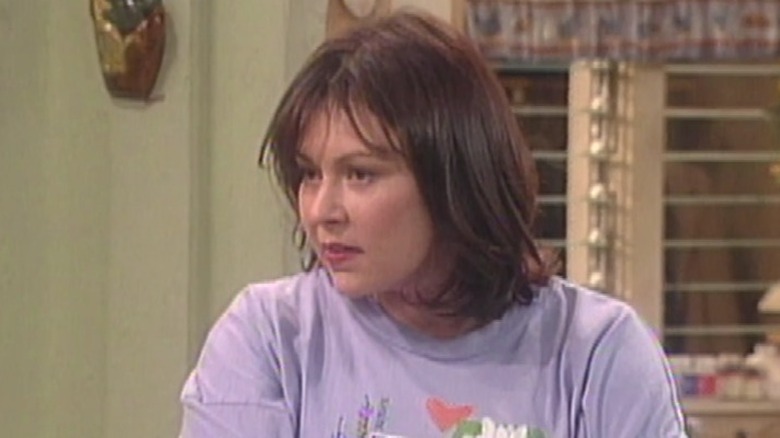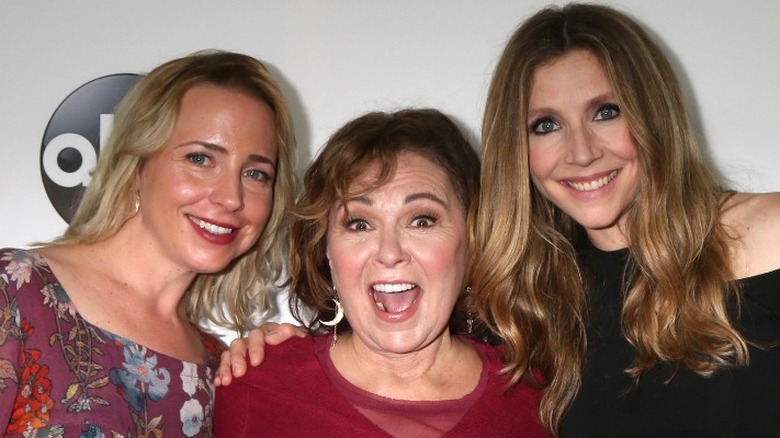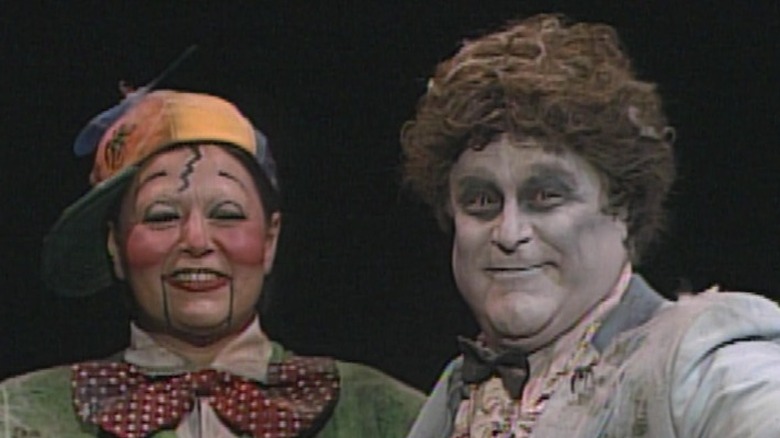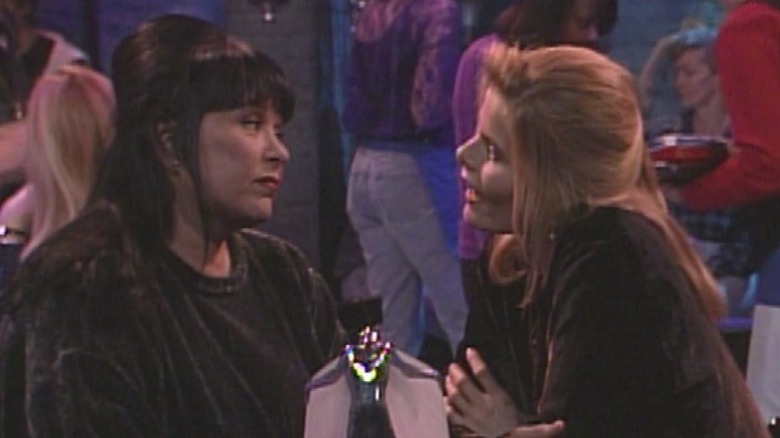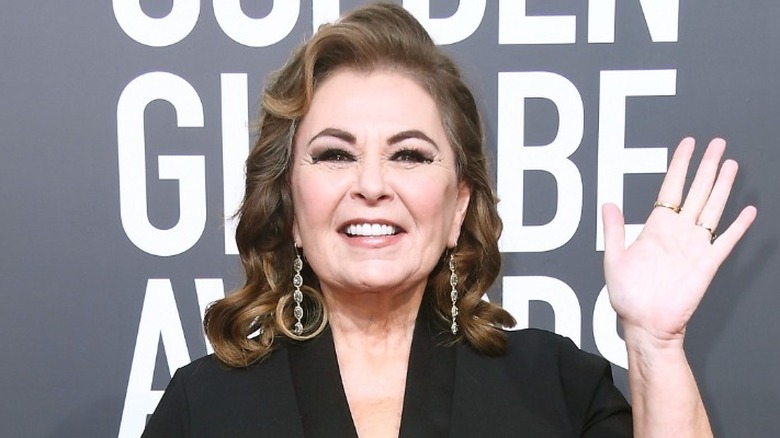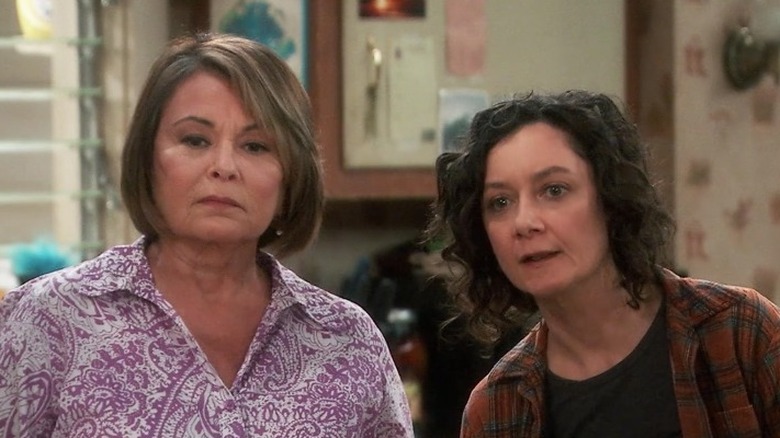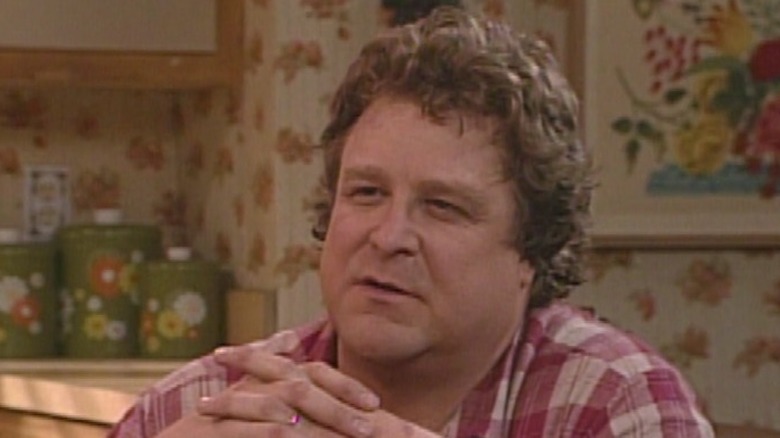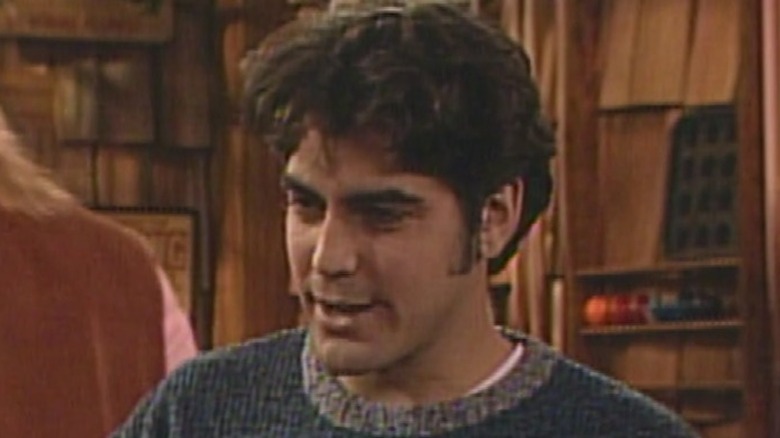What You Probably Never Knew About Roseanne
There's no doubt "Roseanne" left an indelible mark on television sitcom history. Series star Roseanne Barr parlayed her "domestic goddess" comedic persona into one of the most iconic television matriarchs of all time. Throughout its 10-season run, "Roseanne" tackled the struggles of working-class Midwestern life in the fictional town of Lanford, Illinois, with equal parts humor and poignancy. Even as the show took twists and turns to television absurdity in later years, its sincerity and heart endeared viewers to the Conner family. Their earthy relatability remains a benchmark to which other sitcom families aspire.
When "Roseanne" was on the air, the sitcom and Barr herself received considerable media coverage and tabloid gossip. In the '80s and '90s, it was hard to get away from "Roseanne"-centric headlines. But as ubiquitous as Barr and her show were in their heyday, even "Roseanne" superfans might not know about Barr's battles with producers over creative control over the series, how her marriage to Tom Arnold affected the show, or the origin of its fabled Halloween episodes. So put on your best-fitting chicken shirt, snuggle up with your favorite kaleidoscopic crochet blanket, and discover what you probably never knew about "Roseanne."
The battle between Roseanne and her producers
Getting "Roseanne" to the small screen was no easy feat. In the 1980s, television producers Marcy Carsey and Tom Werner were looking for their next hit show. As Carsey told the Television Academy, they wanted to make a series about a working mother. She and Werner commissioned a script from writer Matt Williams. They thought, according to EW, that Roseanne Barr's "domestic goddess" persona would be a perfect fit for their show. Barr agreed, but she and Williams were combative from the start. Vanity Fair reports Williams wanted to call it "Life and Stuff" to keep Barr from having too much control over the series, but Barr wanted to simply call it "Roseanne." Barr got her show name, but it was just the first in a number of contentious battles between Barr and Williams.
The discovery that Williams was credited as the sole creator of "Roseanne" left Barr, as she writes in Vulture, "devastated." She confronted Carsey about the perceived betrayal. Williams, Carsey, and Werner told EW that it was simply a Writers Guild of America matter. Barr, however, felt like the show was based on her life, and wanted the credit. Williams kept the creator credit and Barr said of the defeat, "I just had to write it off." Mere weeks into production, Barr wanted Williams fired, and with her threatening to leave the show, Williams bowed out, taking a large financial settlement for his efforts.
How Roseanne Barr and Tom Arnold's relationship affected the show
Roseanne Barr and Tom Arnold were longtime friends on the stand-up comedy circuit first. They told Vanity Fair that they were buddies before falling in love during the taping of Roseanne's 1987 HBO comedy special, "The Roseanne Barr Show." Never mind that Barr was married and Arnold was in a relationship; soon, they were inseparable and enmeshed in each other's careers. Vanity Fair reports Arnold became and was subsequently fired from his gig as "Roseanne's" warm-up comedian, but he was eventually hired on the show's writing staff after Barr's campaigning. Arnold was, according to ABC News, put in the writer's room to "make sure Roseanne's wishes [were] followed."
The pair married in 1990. In addition to playing Dan Conner's (John Goodman) drinking buddy Arnie Thomas, Arnold ascended to executive producer on "Roseanne," and, as The Los Angeles Times notes, took control of her career, steering Barr to fire most of her team. At the time of their marriage, a source told Vanity Fair, "Roseanne is oblivious to everything but Tom Arnold." The couple brought their outlandish behavior to the "Roseanne" set, even igniting rumors that they's invited their assistant-turned-executive Kim Silva into the relationship. Soon after, Barr and Arnold's marriage was done, and so was the latter's time on "Roseanne." In 1994, Barr fired Arnold and Silva, with The Washington Post reporting that she changed the locks on their shared production office.
Roseanne Barr and Tom Arnold's other sitcoms
"Roseanne" wasn't the only TV collaboration between Roseanne Barr and her then-husband Tom Arnold. The pair produced multiple short-lived sitcoms, including "The Jackie Thomas Show" and "Tom." In 1992, "Roseanne" was the No. 1 show on television; "The Jackie Thomas Show," a vehicle for Arnold, made its debut that December in the time slot directly after "Roseanne." The New York Times reports that ABC was concerned about putting the poorly tested "Jackie Thomas" in the coveted and highly lucrative post-"Roseanne" position. The show had promising debut ratings, but its subsequent decline in viewership left ABC hesitant to renew "Jackie Thomas." That's when things got ugly.
In 1993, Barr threatened to take "Roseanne" to another network in retaliation for what Barr perceived to be, as she told The New York Times, "being treated with disrespect" over "The Jackie Thomas Show." She sent scathing faxes to negative critics of the show, claiming her rebukes were in "self-defense" (via Los Angeles Times). Arnold also told the press that "Jackie Thomas" was picked up for a second season, a tactic a source close to the Los Angeles Times said was an effort to "bully" ABC into renewing the show. Ultimately, Arnold left "The Jackie Thomas Show" to develop a sitcom for CBS, effectively killing the show. His CBS sitcom "Tom" had a short run in 1994, with 12 episodes produced before its cancelation.
The history of the chicken shirt
The "Roseanne" chicken shirt has become one of television's most recognized pieces of anti-fashion. A white shirt printed with a large, illustrated chicken posing in front of an egg, with smaller eggs and chickens in the background, its ugliness was rooted in rebellion. Roseanne Barr writes in Vulture that she clashed with the wardrobe department early in the show's inception, saying they made her look more like a "show pony rather than a working-class mom," so she wore her own clothes on the set. Apparently, after this dispute, "Roseanne's" wardrobe department developed a sense of humor when they introduced the chicken shirt in Season 2. First worn by Becky (Lecy Goranson), the shirt started as a joke, but once Barr saw the eccentric design, its ugliness became something of an artistic statement (via YouTube).
The chicken shirt played heavily in Season 5's finale episode "Daughters and Other Strangers." The shirt rotates among cast members with not just Roseanne, but also Jackie (Laurie Metcalf), Darlene (Sara Gilbert), D.J. (Michael Fishman), and Dan all sporting the garment during the episode (via Decider). The chicken shirt lived on as an apron design sported by Roseanne at her restaurant, the Lanford Lunch Box. Not forgotten as a critical piece of "Roseanne" folklore, the chicken shirt also appears during Season 10's opening credits.
The story behind Roseanne's divisive Season 9
Called "incalculably ill-judged" by Rotten Tomatoes Critics Consensus, "strange, scattered, and self-conscious" by Vulture, and one of the worst series finales of all-time by Variety, Season 9 of "Roseanne" left longtime fans confused at best and alienated at worst. At the onset of Season 9, The New York Times reported that both Roseanne Barr and ABC decided it would be the show's last. Breaking from the show's working-class family strife, Season 9 saw the Conners win $108 million in the lottery. Untethered from stories about financial strife, "Roseanne" bounced between wish-fulfillment stories and self-referential television parodies. Dan was notably absent from most of the season's episodes. Prior to Season 9, Goodman walked away from "Roseanne" because he was "fed up" with the show's on-set drama (via The New York Times).
Even though Season 9 was tentatively the show's swan song, there were talks of a "Roseanne" spin-off series. The Los Angeles Times purports the show would have seen Roseanne Conner and D.J. moving to Las Vegas. The idea didn't stick, and ABC balked at the show's high price (per The New York Times), so the series wrapped in 1997. The "Roseanne" finale, in which the entire lottery premise is revealed to be Roseanne's fantasy, remains controversial to this day.
An Absolutely Fabulous crossover
An unlikely meeting of comedy divas happened during Season 9 of "Roseanne," when America's "domestic goddess" crossed paths with British comedy's most fabulous "sweetie darlings." The season's Halloween episode "Satan, Baby" is a crossover event with the UK comedy sensation "Absolutely Fabulous." In the episode, newly minted millionaire Roseanne (Roseanne Barr) and her sister Jackie attend a tony party in New York City. Lurking in the wings are London fashion mavens Patsy (Joanna Lumley) and Edina (Jennifer Saunders). The foursome drink excessively and the episode transitions into a "Rosemary's Baby" parody.
"Roseanne's" connection to "Absolutely Fabulous" is not entirely inorganic. In 1995, The New York Times reported that Roseanne Barr purchased the rights to produce an American version of the BBC series, with the show's creator and star Jennifer Saunders attached as a consultant. The project was a hot commodity in Hollywood, but "AbFab" never got off the ground. However, Barr and Saunders collaborated on "Roseanne," acting in and co-writing "Satan, Baby." Saunders later told Graham Norton that the crossover experience was "very weird," adding, "It was very bizarre. We were quite confused. But it was fun" (via Digital Spy).
Roseanne was at odds with the show's writing staff
Roseanne Barr was not known in Hollywood for being an easy boss. Barr might be revered as a trailblazing female talent bucking the system of the Tinseltown old guard, but she's also mercurial and difficult to work for. Notorious for her penchant for firing staff, Barr admits to ABC News that she made a list of people whom she'd fire when the show reached No. 1 in the ratings. She followed through on her promise. "Roseanne" writer and executive producer Bruce Helford said his agent and lawyer warned him that Barr fires everyone after one year and sure enough, he was eventually canned. Even future television powerhouse Chuck Lorre was the focus of Barr's ire. He told the Television Academy that he was almost fired because she hated his first script.
The relationship between Barr and "Roseanne's" writing staff was tumultuous, if not outright demeaning. Writers on "Roseanne" recall to EW how Barr referred to them by numbers instead of names, a practice scribe Amy Sherman-Palladino described as dehumanizing. Barr, on the other hand, said the practice stripped the writers of their "self-entitlement" and said, "I think they learned something from it." While some writers clashed with her abrasive management style, Barr credits herself for championing female writers and giving then-unknown talents like Joss Whedon and Judd Apatow their first writing gigs (via Vulture).
The reason there were two Beckys
Lecy Goranson and Sarah Chalke both played the Conners' eldest daughter, Becky, through the run of "Roseanne." Goranson originated the character, playing Becky for the show's first five seasons. However, the role of Becky on "Roseanne" was recast when Goranson decided to attend college. According to EW, after testing hundreds of actors for the role, Goranson lookalike Chalke was cast as Becky. Chalke stuck around "Roseanne" for part of Season 6 and all of Season 7, but Goranson's stint in higher education didn't make her a stranger to the series. She was able to mix her scholarly pursuits with sitcom stardom, returning to "Roseanne" for parts of Season 8, sharing the role with Chalke (via TheWrap). Eventually, Chalke became the show's sole Becky for Season 9.
The humor of having two actors play the same character, sometimes in the same season, was not lost on "Roseanne." The show included self-aware jokes about Goranson and Chalke playing the same role. In a nod to TV history, Goranson and Chalke also played off their "nearly identical" looks in a parody of "The Patty Duke Show" theme song parody in Season 8. When "Roseanne" returned for Season 10 in 2018, both Goranson and Chalke came back to the show, but only Goranson played Becky. A new role was created for Chalke and, for the first time, both actors shared the screen.
Roseanne paved the way for Halloween-themed TV episodes
Before "Roseanne," Halloween-themed network television shows were few and far between. The show arguably contributed to the invention of the spooky season TV genre. Roseanne Barr tells Yahoo Entertainment that ABC resisted making a "Roseanne" Halloween show out of fear it would alienate part of their audience. Barr rebutted, arguing that Halloween was popular. Barr won the debate, calling her victory "the first dragon we slayed on the 'Roseanne' show." With the network greenlighting the concept, a beloved "Roseanne" tradition was born in Season 2's episode, "BOO!," where the Conners stage an elaborate haunted house for unsuspecting trick-or-treaters.
In every subsequent season, "Roseanne" pulled out all the stops to celebrate Halloween. Elaborate costumes, hilarious pranks, and frightful antics had viewers tuning in to see who could out-scare whom. Barr jokingly pointed out to Yahoo Entertainment that John Goodman noted that the Conners were poor because they spent all their money on Halloween. Even if the Conners went broke celebrating the season, the amount of fun they had was priceless. Halloween-themed TV episodes are now ubiquitous and we have "Roseanne" to thank for all the frightful celebrations.
Roseanne was never afraid of addressing then-taboo topics
From its debut in 1988, "Roseanne" was not just another light-hearted sitcom. Roseanne Barr writes for Vulture that at the show's onset, she needed "Roseanne" to not just be funny, but also about "the struggle to survive and to break taboos." The show aired episodes centered on domestic violence, racism, and drugs. Throughout the series' run, "Roseanne" tackled these controversial topics with aplomb, but not without resistance.
Barr fought with network censors over several issues she wanted "Roseanne" to address, including shows about menstruation and same-gender kissing. The Season 1 episode "Nightmare on Oak Street" made headlines for its groundbreaking depiction of Darlene's (Sara Gilbert) first period. Barr later told Oprah the episode met with resistance from ABC, saying "it was hard because that had never been on television" (via HuffPost). Later in the show's run, ABC purported that "Rosanne's" Season 6 episode "Don't Ask, Don't Tell," which featured a kiss between Roseanne Conner and Sharon (Mariel Hemingway) at a gay bar, violated network standards and would not allow the episode to air (via The New York Times). Barr demanded the episode be shown and it eventually was, resulting in critical praise and high ratings. Actor Michael Fishman, who played D.J. Conner, celebrates "Roseanne's" legacy of breaking social taboos, telling Today, "I think we did a nice job of doing all these things without crossing the line."
The show was a ratings hit, but not an Emmys darling
During its heyday, "Roseanne" was one of the most popular television shows in America, so it might come as a surprise that it was virtually snubbed by TV's most prestigious award. Upon its debut, "Roseanne" was one of the most-watched shows in America (per The Wrap), battling it out with "The Cosby Show" for the top spot in ratings. The following season, "Roseanne" topped "Cosby" in Nielsen numbers (via The New York Times). The show was a consistent hit for ABC and was recognized by the The New York Times in 1994 as "the most watched entertainment show in television over the past five years."
Despite its popularity, "Roseanne" wasn't nominated for a single Emmy Award for Outstanding Comedy Series during its 10-season run. Roseanne Barr lamented her initial lack of Emmys recognition to the Los Angeles Times, telling them the snub hurt and was likely retribution for on-set controversies. Barr eventually was nominated for, and won, an Emmy for Outstanding Lead Actress in a Comedy Series in 1993. Her co-stars John Goodman and Laurie Metcalf received Emmys for their work on the series, with Goodman earning seven Emmy nominations and Metcalf winning three Emmys. While "Roseanne" certainly earned its acting accolades, it's baffling that the show itself was never recognized in its totality.
The ill-fated Roseanne revival
In 2017, Deadline broke the news that most of "Roseanne's" original cast would reprise their roles for a limited series revival on ABC. Even as the excitement mounted, there was the problem of how to address the continuation of the series after its Season 9 finale, in which Roseanne Conner (Roseanne Barr) reveals Dan (John Goodman) is dead and that the entire lottery-winning plotline was just her fantasy. Well, it's television after all, and while what has been seen typically cannot not be unseen, "Roseanne" chose to simply ignore most of Season 9's finale. In Season 10's opener, Dan is still alive and other questions, like who exactly Darlene and Becky married, were left unanswered, as Vanity Fair points out.
If any love was lost between "Roseanne" fans and the show's Season 9 finale, it wasn't apparent when the "Roseanne" revival aired in 2018. According to the The New York Times, the first episode of the "Roseanne" pulled in over 18 million viewers, the highest network comedy ratings in years. In fact, AdWeek reports "Roseanne" was 2018's most-watched series in total viewers. Despite its popularity, the celebration at "Roseanne" was short-lived. In May 2018, ABC canceled the series after Roseanne Barr posted racist comments on Twitter, with ABC Entertainment president Channing Dungey stating, "Roseanne's Twitter statement is abhorrent, repugnant and inconsistent with our values, and we have decided to cancel her show" (via The Hollywood Reporter). The show was retooled and relaunched as "The Conners" in October 2018.
John Goodman's fateful audition
There was never any doubt that John Goodman would play Dan Conner on "Roseanne." Before being cast as the Conner family patriarch, Goodman had a series of small roles in classic '80s films like "Revenge of the Nerds" and "Raising Arizona," but he was hardly a star. "Roseanne" co-executive producer Tom Werner tells the Television Academy that they were looking for an actor who could match Rosanne Barr's charisma. Goodman, who was spotted acting on stage, nailed his screen test with Barr. ABC wanted "Roseanne" to move quickly into production, but Goodman had a scheduling conflict. Werner and his producing partner Marcy Casey were so confident of his talents that they forfeited a coveted time slot for the show in order to keep Goodman in the role.
Goodman himself had good feelings about his "Roseanne" audition. In a career retrospective filmed for Vanity Fair, Goodman recalls liking the script and immediately hitting it off with Barr. Goodman says he left the audition knowing he had the job, something that rarely happened for him. He welcomed the potential career stability "Roseanne" could provide and he used the role as an ongoing learning opportunity. Goodman found job security in Dan Conner, having played the character for decades in not only "Roseanne," but also its spin-off series, "The Conners."
Roseanne was a launching pad for many Hollywood heavyweights
"Roseanne" was a serious incubator for up-and-coming Hollywood talent. Many of the show's writers and actors went on to become some of the entertainment industry's most powerful players. The writing room on "Roseanne" was home to future television creative powerhouses like "Gilmore Girls" and "The Marvelous Mrs. Maisel" creator Amy Sherman-Palladino, super producer Chuck Lorre, and "Buffy the Vampire Slayer" mastermind Joss Whedon. Judd Apatow shares on "Tell Me More with Kelly Corrigan" that supporting Roseanne Barr with her joke writing was his first big job. Even Norm Macdonald penned several "Roseanne" episodes before "Saturday Night Live" stardom.
Not only did "Roseanne" provide a solid start for behind-the-scenes talent, but some not-yet-big-time actors got some serious screen time on the show. Although some might have forgotten George Clooney's "Roseanne" character, he played Jackie's love interest, factory boss Booker Brooks, in the show's first season. Before Clooney became an Oscar-winning movie star and filmmaker, he was just a working guy sporting a pencil behind his ear. Audiences became acquainted with Johnny Galecki as David on "Roseanne," but after the series, he catapulted to global fame on "The Big Bang Theory." Sara Gilbert parlayed her star-turn as Darlene into a successful producing career, co-creating the CBS chat show "The Talk," and she initiated and executive produced the Season 10 "Roseanne" revival (via ET).
